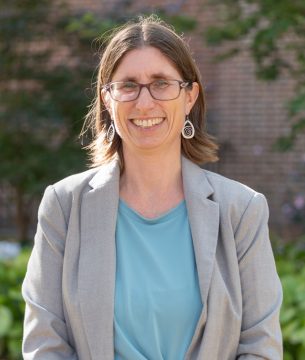Abigail (Abby) Konopasky, PhD, director of medical education research and scholarship and associate professor of medical education at Geisel School of Medicine, has received a Medical Education Scholarship Research and Evaluation grant from the Northeast Group on Educational Affairs (NEGEA) to initiate a new project.

NEGEA, one of four regional groups of the Association of American Medical Colleges, fosters excellence in medical education and is interested in promoting collaboration across and within institutions to stimulate the development of a community of medical education scholars.
Geisel’s Konopasky and her research partner Carmen Black, MD, assistant professor of psychiatry and director of Social Justice and Health Equity (SJHE) Education at Yale School of Medicine, are investigating the generational impact of racial trauma.
Although medical education is beginning to address racism through its research and practices, the field has not fully addressed the generational impact of racial trauma. Current Diversity, Equity, Inclusion, and Justice (DEIJ) efforts still apply “Black or African American” to all Black racialized physicians or trainees regardless of historical or cultural background. This approach ignores the experiences of those whose ancestors were enslaved here within the U.S.— Historically Black Americans (HBAs), while many DEIJ leaders are themselves HBAs.

The purposes of this critical qualitative interview study, Konopasky explains, are to examine how DEIJ leaders’ historical and cultural identities and resources influence their exercise of agency to resist white supremacy and, based on those findings, to work collaboratively with HBAs in medicine to develop recommendations for integrating historical and cultural perspectives into DEIJ work.
“This grant will allow us to see and honor the full historical identities of those doing the important work of Diversity, Equity, Inclusion, and Justice,” Konopasky says, “so that future work in medical education—ours and that of others—can move from the homogenizing category, ‘underrepresented in medicine’ to seeing the full identity of each member of our community.”
Drawing on both linguistics and psychology, Konopasky’s research centers on linguistic tools to better understand inequity, agency, and resistance with currently and historically marginalized individuals. Her Critical Approaches to Language and Equity (CALE) Lab brings together linguistic and narrative tools with critical theories such as Black Feminist Theory, Queer Theory, and Critical Disability Studies to both uncover and understand experiences of inequity and injustice.
Black’s research focuses on promoting historically informed racial justice within academic medicine and addressing iatrogenic (unintentionally induced) influences of poor patient care—specifically racism and mental health discrimination within daily clinical practice. She is a national advocate for patient and provider safety promoting the equitable treatment of behavioral emergencies by removing police- and security-based interventions from general hospital medicine.